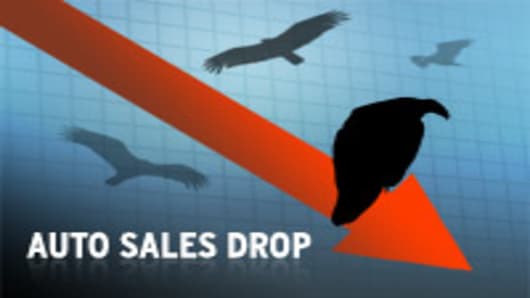Analysts see U.S. auto sales declines ranging from about 10 percent to more than 16 percent in July from a year earlier as carmakers struggled to sell big trucks and SUVs and provide enough smaller vehicles that customers have favored.
Projections were based on adjustments for two extra selling days in July compared with a year earlier. (See accompanying video for more information on auto leases...)
Forecasts range from 13.2 million vehicles to 13.9 million. At the low end of expectations, sales would mark the lowest level since 1993.
Chrysler, with a lineup loaded with larger vehicles, is expected to tally the worst declines among the top six U.S. automakers. GM and Ford are expected to be close behind.
GM's sales declines could range from about 22 percent to 27 percent; Ford's from 12 percent to 26 percent; and Chrysler's anywhere from 19 percent to 35 percent, analysts said.
Edmunds expects the three U.S.-based automakers to have a combined market share of 44.4 percent in July, down from 49.4 percent a year earlier.
Toyota could report a sales drop of 10 percent to 13 percent; Nissan a drop of 6 percent to 7.5 percent; and Honda a sales growth of more than 4 percent.
Environment Stays Weak
"We think that the selling environment has remained very weak with consumers remaining on the sidelines given continued fears of a deteriorating macro outlook exacerbated by stock market volatility, still high gasoline prices, and headwinds from credit," Goldman Sachs analyst Patrick Archambault said.
The uncertain credit market prompted Chrysler to eliminate lease offerings through its Chrysler Financial credit arm. GM and Ford have continued to offer leases as an option through their credit units, by tightening requirements.
The changes to leases, most of which take effect in August, may further pressure results for automakers, but could have provided a short-term boost toward the end of July.
Leases often have been structured to make car payments more affordable for marginal buyers or for customers who may want to drive a car they could not afford to buy.
"The net effect could be an additional 5 percent to 10 percent headwind to sales," Johnson said.
At the start of the year, automakers and industry analysts largely were optimistic that U.S. auto sales would rebound in the second half of 2008. That sentiment has gradually eroded to the point that most do not see a significant rebound in 2009.
Standard & Poor's, which cut its ratings on the Detroit Three and their financing units on Thursday, said it expected 2008 auto sales to come in at near 14.4 million units, down from 16.1 million in 2007 and 16.5 million in 2006.
"We expect the decline to continue into 2009," said S&P chief economist David Wyss.
A sharp surge in gas prices to more than $4 per gallon nationwide exacerbated a shift in consumer demand toward smaller vehicles from April through June. It is a trend analysts expect to have continued through July.
The shift caught most automakers by surprise, forcing accelerated restructurings at the U.S.-based automakers and production cuts on trucks at transplant automakers. All carmakers have pushed to provide stronger-selling smaller vehicles in the necessary numbers to meet demand.
The combined market share for compact cars, compact trucks and compact SUVs is expected to be about 35 percent in July for the U.S. market, up from 23 percent five years ago, according to Edmunds.com.


